No hotel opening in the western United States has been more anticipated in 2024 than Populus, the new 265-room, 13-story high-end property off Denver’s Colfax Avenue. Populus promises to be the world’s first “carbon positive” hotel — an eco-first mantra aimed at the growing specter of climate-conscious travelers and the growing demand for all types of professional travel, from conferences to concerts, to be done with less environmental impact. I spent two nights at Populus the week the hotel opened, staying in a corner suite on the sixth floor and experiencing each of the hotel’s food and beverage concepts. I’m a travel editor who oversees hospitality content and who regularly reports on sustainable travel. I’d been anticipating this stay for months and sitting in the second-floor lounge writing this story before checking out, I can honestly say I’ve never stayed in a concept more ambitiously auspicious — nor one that better delivers on its promise.
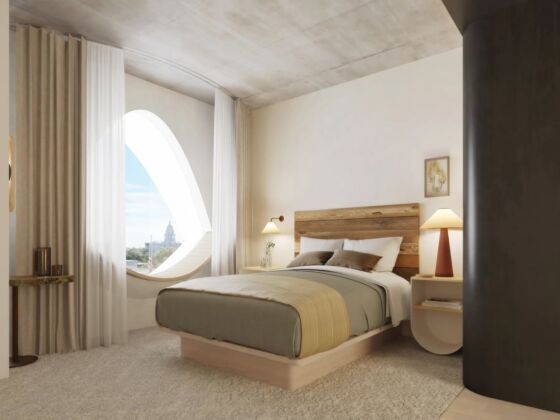

What It's Like to Stay at the New Populus Hotel in Denver
How Populus’ ‘carbon positive’ claim stacks up in reality
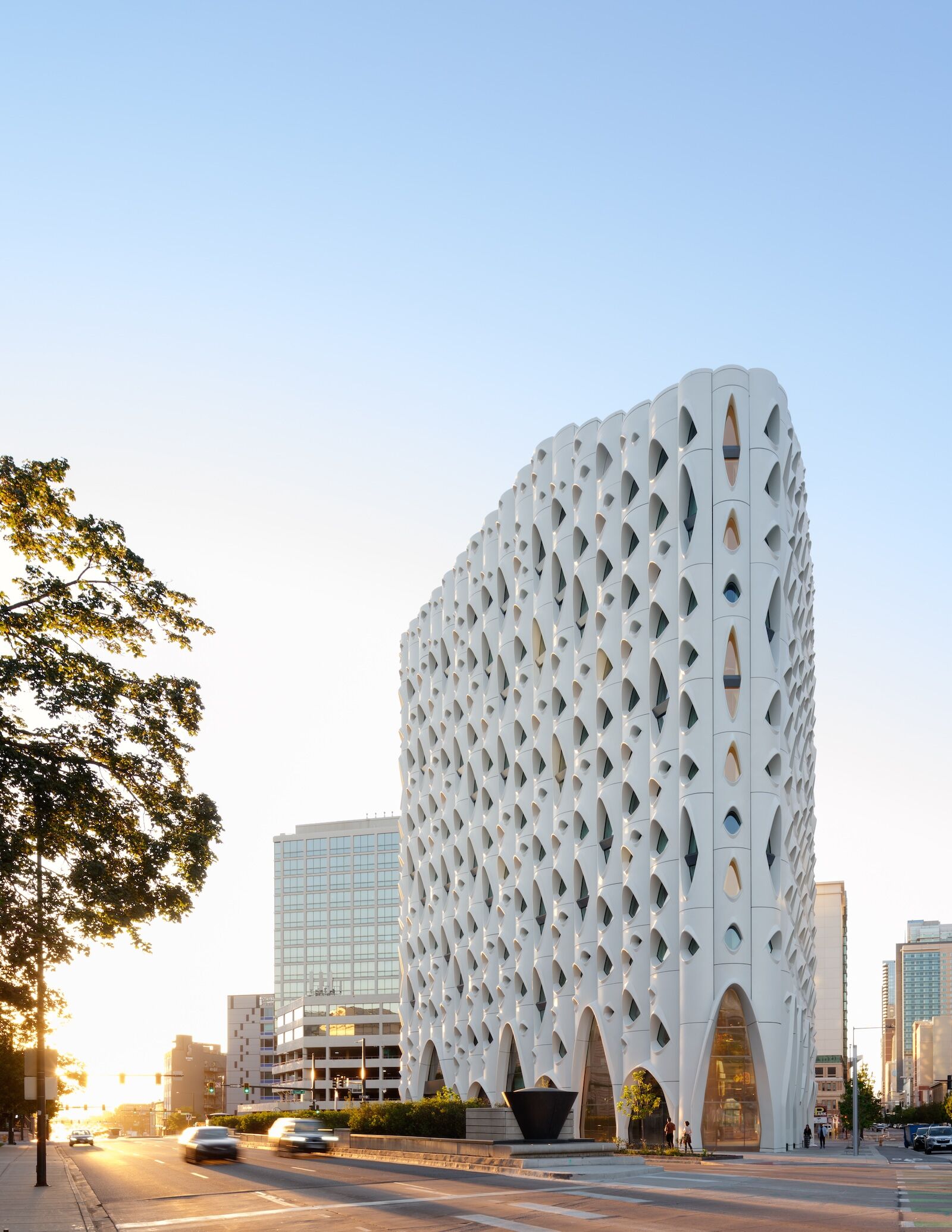
A facade that commands attention. The “aspen-eye” windows both amplify and filter natural light, and help to optimize the building’s temperature. Image courtesy Jason O’Rear
Central to the appeal of Populus is its claim to be the first “carbon positive” hotel. For this to be true, the hotel must sequester more carbon than it emits. The promise is built around the utilization of renewable energy, the elimination of food waste (a powerful emitter of greenhouse gasses), and a massive tree planting initiative to offset and exceed what carbon the property does emit. Being in an urban location, architecture firm Studio Gang and the property’s owner, Urban Villages, the company behind the evolving Rail Spur district in Seattle, leaned heavily into new urbanism by embracing efficient use of space and multi-purpose areas.
“It’s not a huge footprint for 265 rooms,” Director of Sales Jared Johnson told me over coffee at Little Owl coffee bar in the lobby. “Usually if you have this number of keycards, you’re looking at a tower, and that’s much more emissions.”
The name “Populus” comes from the scientific name of Colorado’s native Aspen trees, populus tremuloides. The hotel’s design builds on this, with a library in the lounge and event space stacked with books about regional biology and wildlife, The windows are designed to resemble the “aspen eye” peepholes common in tree trunks on the whitish bark of aspen trees, but also serve a function – the “eyelids” above and below them filter heat and light to optimize the building’s heating and cooling efforts while simultaneously providing a unique viewing experience to guests. They also make for some incredible views of the surrounding city scape.
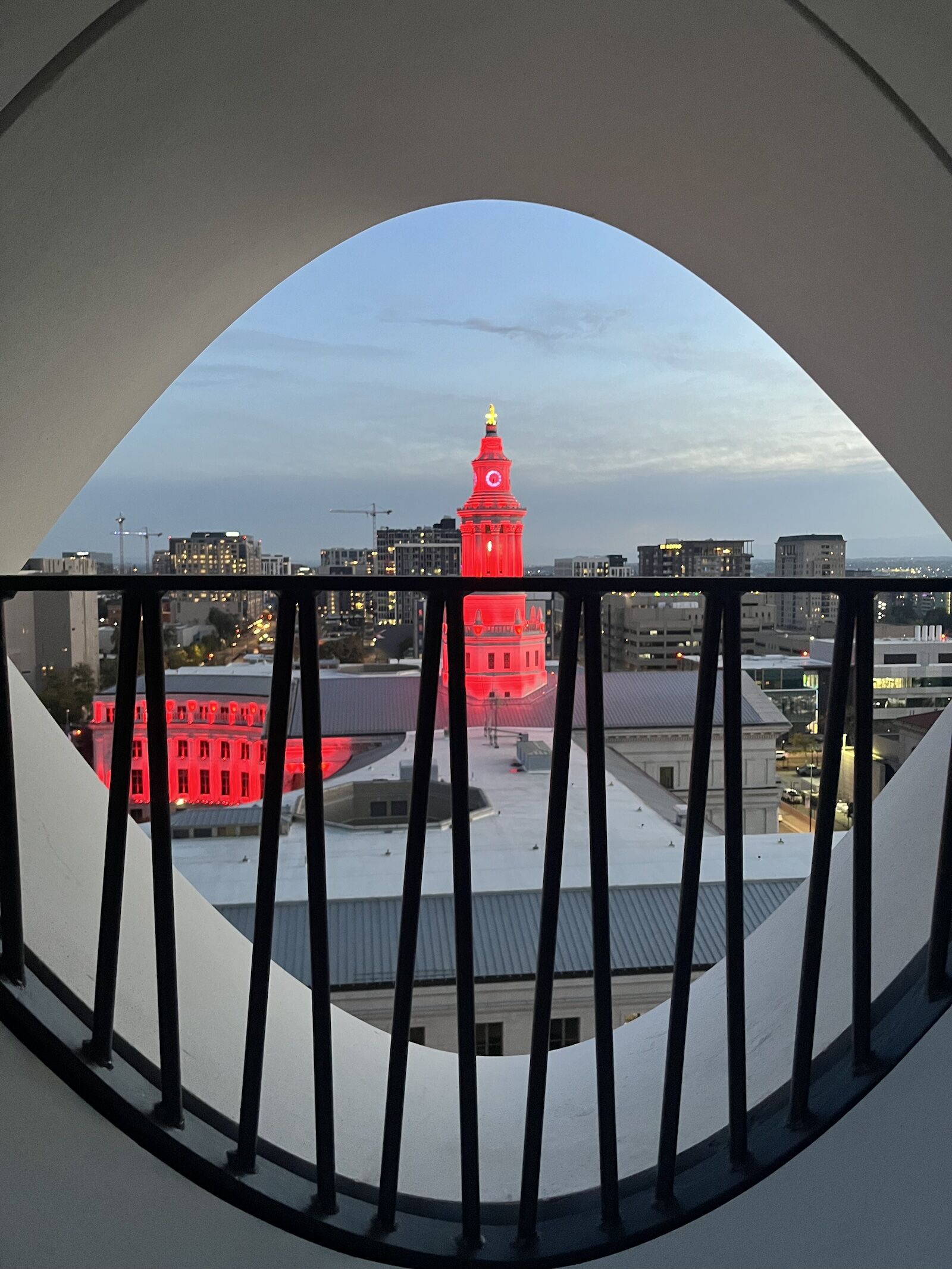
Looking through an “aspen eye” to the Denver City and County Building, lit up to perfection. Photo: Tim Wenger
Key to the “carbon positive” aspect of Populus is its “one night, one tree” program. The hotel plants a tree for each guest night as part of its larger reforestation initiative, with planting taking place in two areas of western Colorado – the Grand Mesa, Uncompahgre, and Gunnison National Forests and the White River National Forest. To date the hotel’s efforts have installed over 70,000 trees in the Gunnison National Forest, reforesting more than 172 acres.
Studio Gang used low-carbon cement dotted with fly ash in the property’s construction. The fly ash reduces the concrete’s water demand and helps it flex better by removing friction in the concrete mixture. Guest room fixtures are designed to outlast the standard 10-year replacement window utilized by most high-end hotels, further cutting down the footprint of the property.
Populus has a large photovoltaic solar panel array on its roof along with a heat recovery system that circuluates air throghout the property, cutting back on emissions related to heating and cooling. The interior design firm, Wildman Chalmers Design, utilized recycled elements inside the property whenever possible. The most visible example are the wood panels lining ceilings throughout common spaces, all of which are sourced from repurposed ski area fencing.
Most of the rooms are quite small — under 200 square feet — and that’s key to the mantra here. Johnson told me One you leave the main floor, the aesthtic is decidedly calming, designed as an oasis from the bustling urban streets outside. The second floor features a library and ample lounge space that serves well for laptop warriors, doubling as the hotel’s event space for small-scale gatherings.
The lack of dedicated parking meant that no cement or other materials were used to build a car park, and instead the hotel installed bike parking racks on two sides of the building (it will soon offer a bike shop on site, and valet parking is readily available for restaurant guests). Key cards are made of cork and were handed to me in a plantable holder stuffed with wildflower seeds. My front yard stands to benefit as a result.
The hotel’s restaurants, Stellar Jay, Pasque, and Little Owl Coffee, utilize an on-site biodigester system in which microorganisms break down all food waste from the restaurants to produce a compost-ready excrement that the hotel then contributes to a local composter. Food is sourced from “regenerative, biodynamic, and organic farmers. Single-use plastic is all but banished from the hotel, to the degree that rooms feature a kettle and pour-over coffee rather than a Keurig and boxed water is available in place of plastic bottles for guests who seek filtered H20.
The Populus experience is a look to the future of urban hospitality
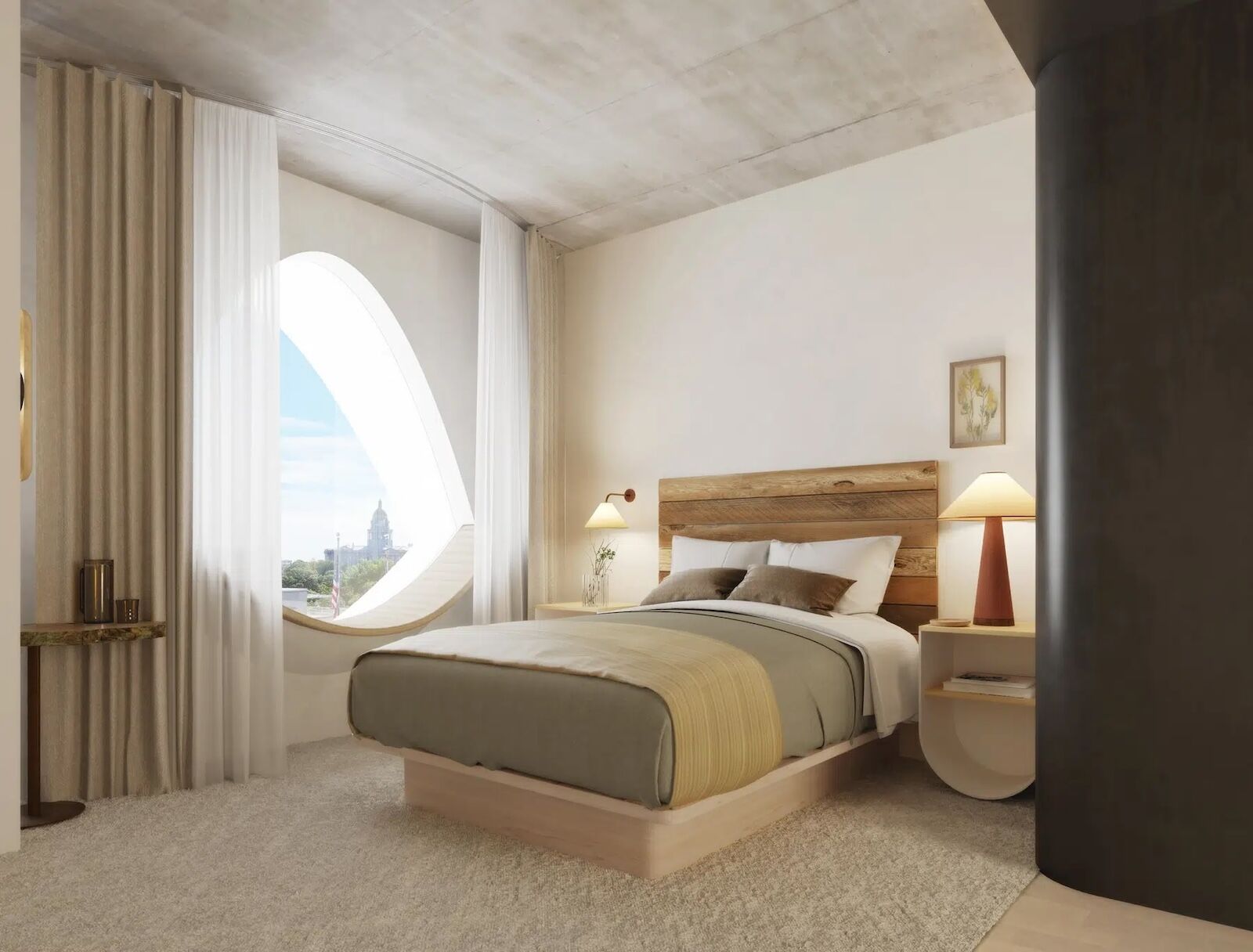
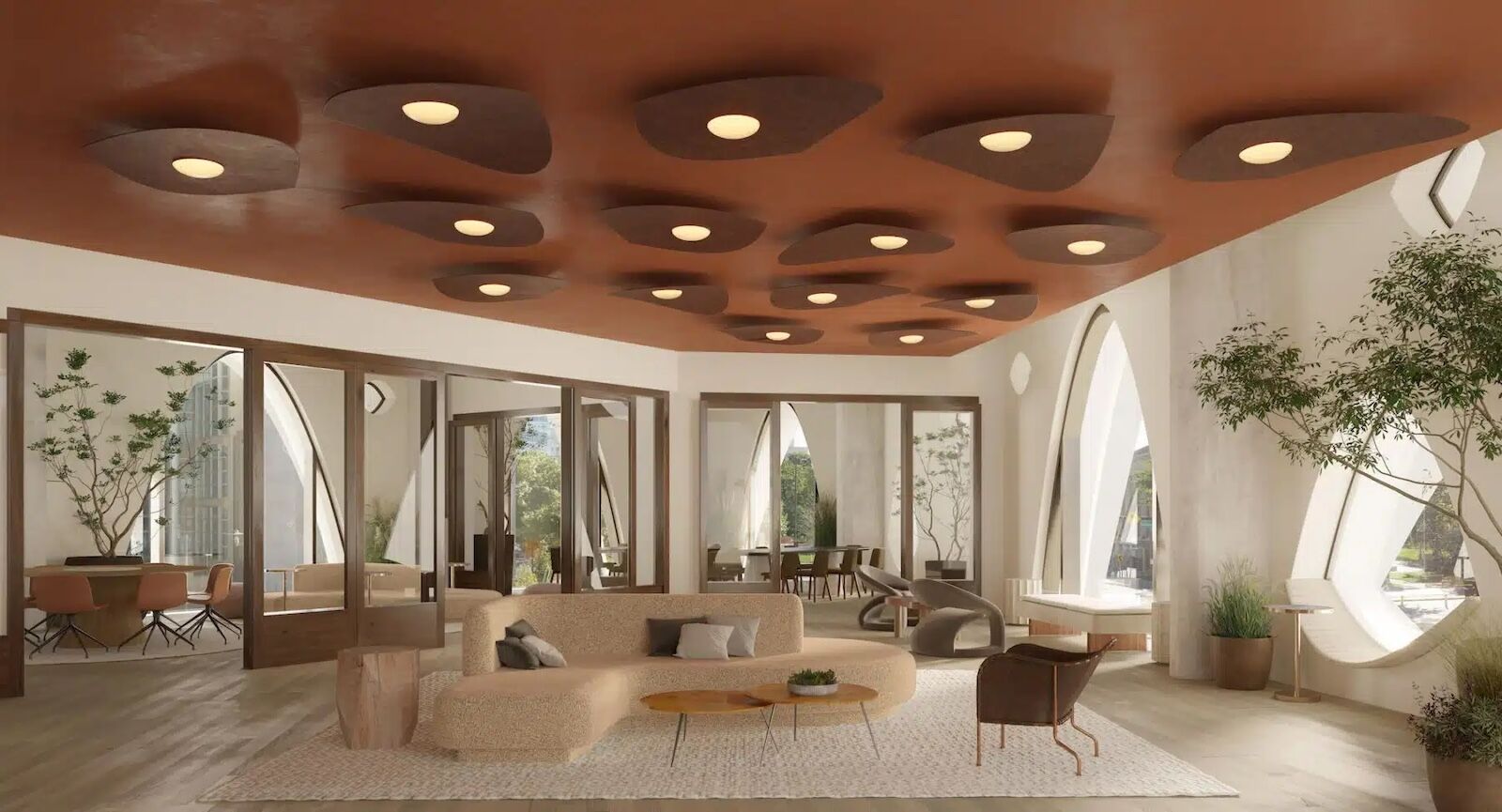
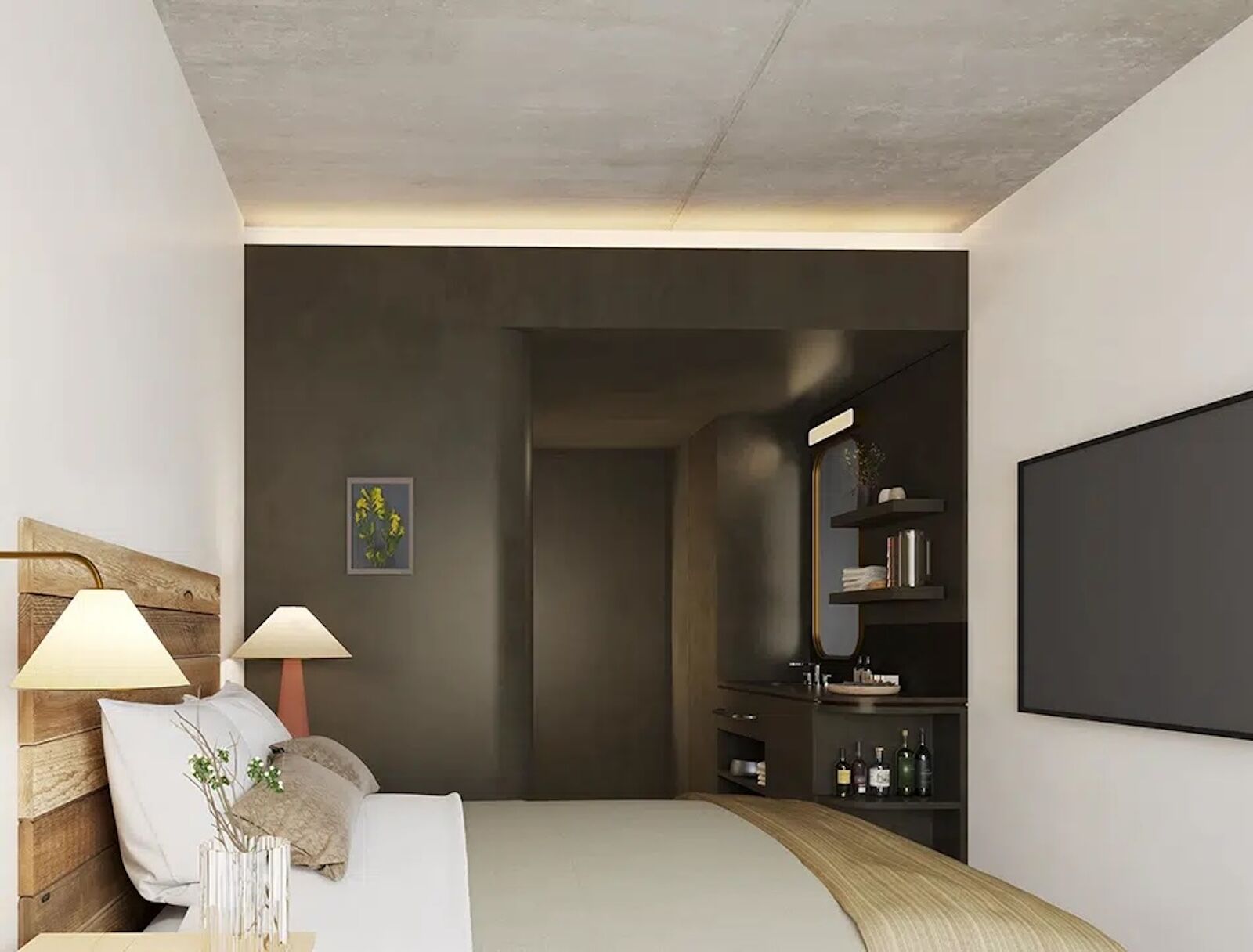
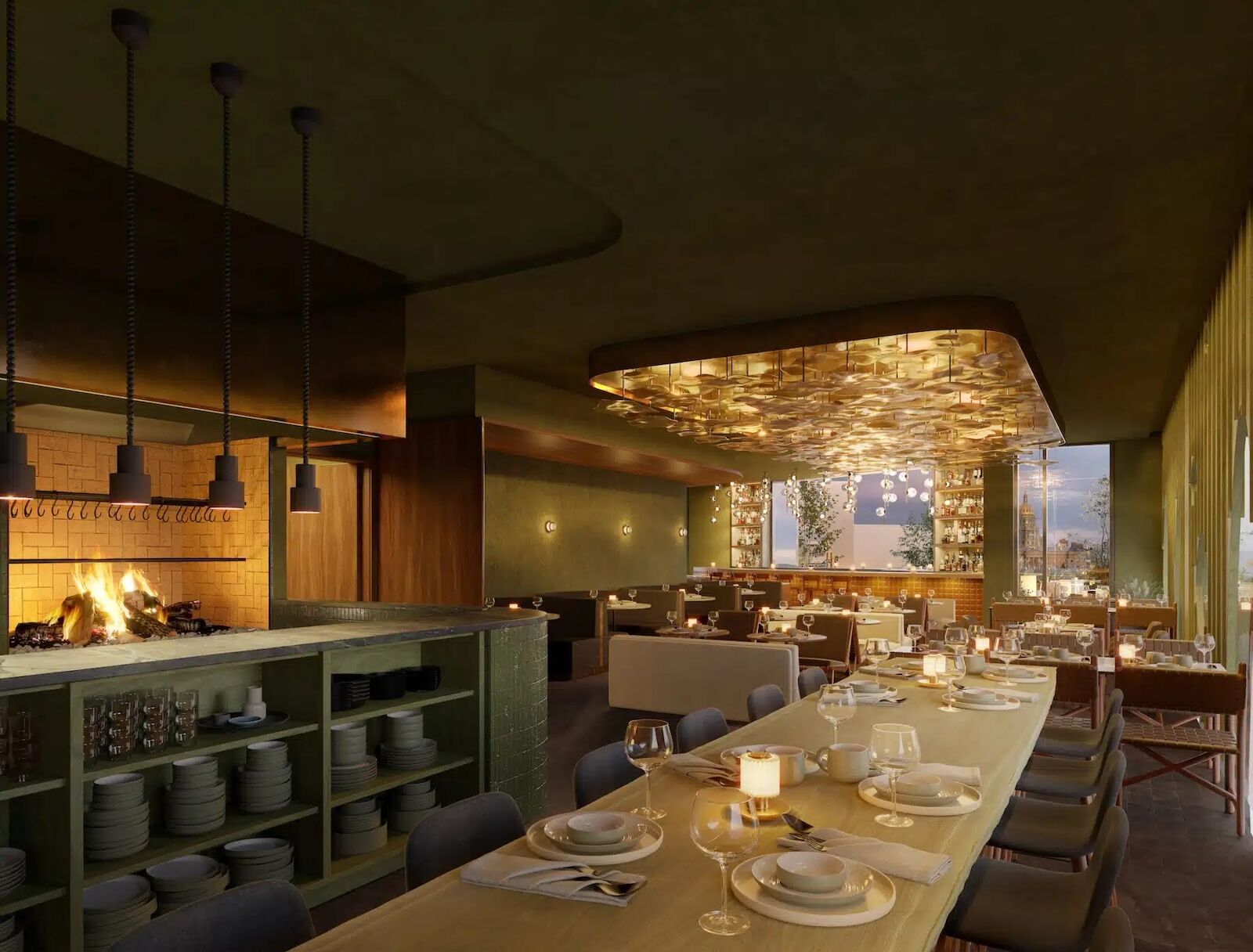
Entering my room on the hotel’s sixth floor felt like walking into a corner suite 20 years from now. Several “aspen eye” windows of varying sizes cast natural light across the space from the east, across the bed and desk/minibar and out the northwest windows with clock-like precision. Much the same as when camping, I could tell what time of day it was throughout my stay simply by following the flow of sunlight through my room. As an aside, the high concentration of windows resulted in a lot of curtain closing come bedtime (“so many curtains!” said my wife). This room runs about $640 per night during summer high season, with the smaller queen rooms starting closer to $200 per night.
The Populus guest experience is so well thought out that even basic trip-planning logistics are three steps ahead of the present-day norm. Notably, there is nowhere to park a car onsite. This lack of dedicated parking means that arriving via public transit or bike is the most stress-free way to get to Populus. This bodes well with the increased use of environmentally-friendly “new urbanism” tactics increasingly deployed to new construction and remodel projects in cities and towns across the US, a successful example on a larger scale being Battery Park in New York City.
Surrounding the hotel are a run of separated bike lanes and the property is less than a block from public transit. I arrived in Denver via the Bustang intercity bus service, which deposited me at Union Station, a 15-minute walk from the hotel along Denver’s iconic 16th Street Mall. Guests flying into Denver International Airport can hop on the A-Line train to Union Station and enjoy the same walk, or hop on the free “Mallride” bus that runs right up 15th and 16th Streets. Rideshare drop off is easy right out front. Blocks away are downtown’s main attractions including the Colorado Convention Center, the Mall, and dining of every caliber from street food trucks to Michelin-starred restaurants. Drive yourself to the hotel and you’re already missing the point.
The in-room experience at Populus
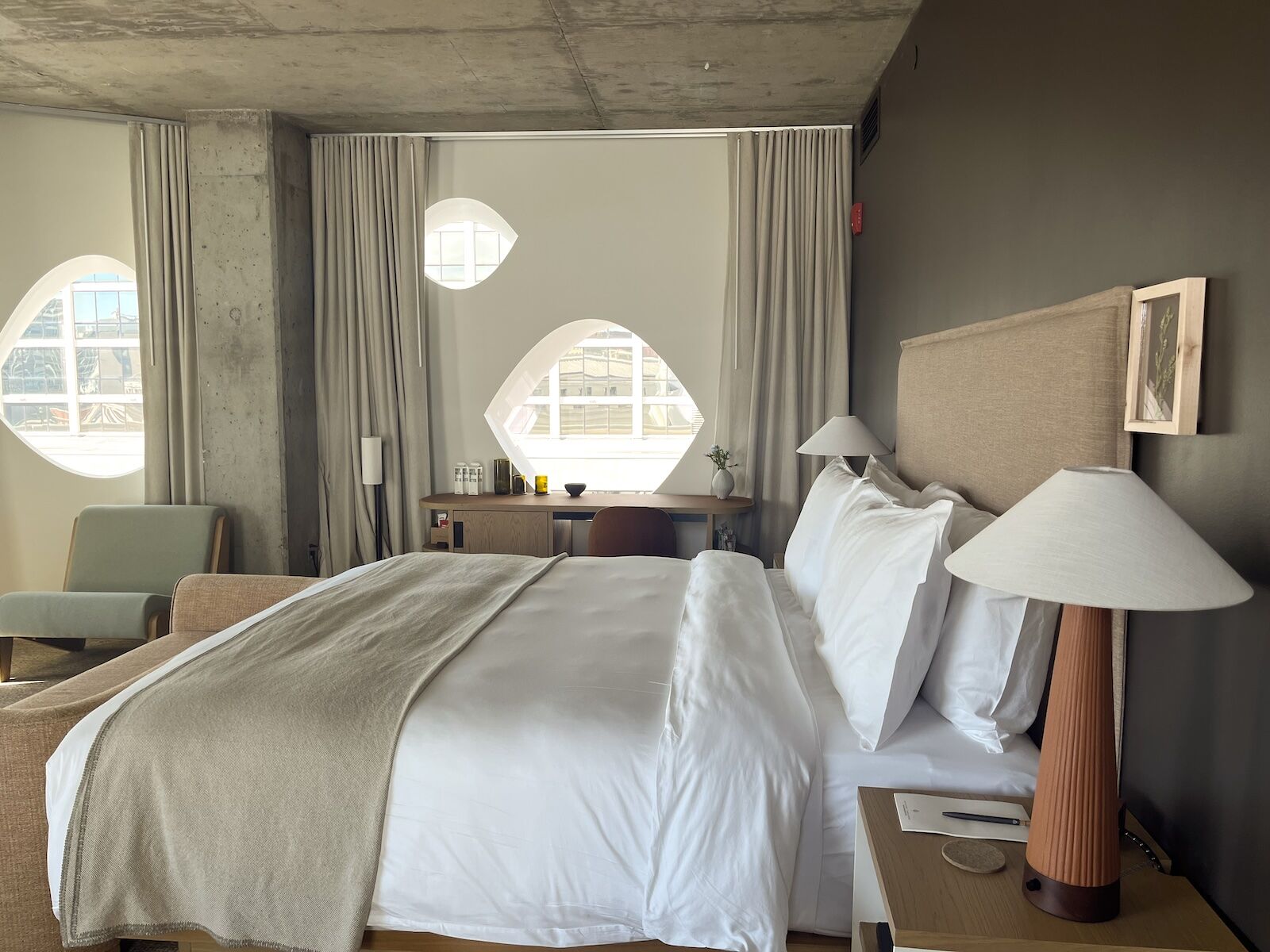
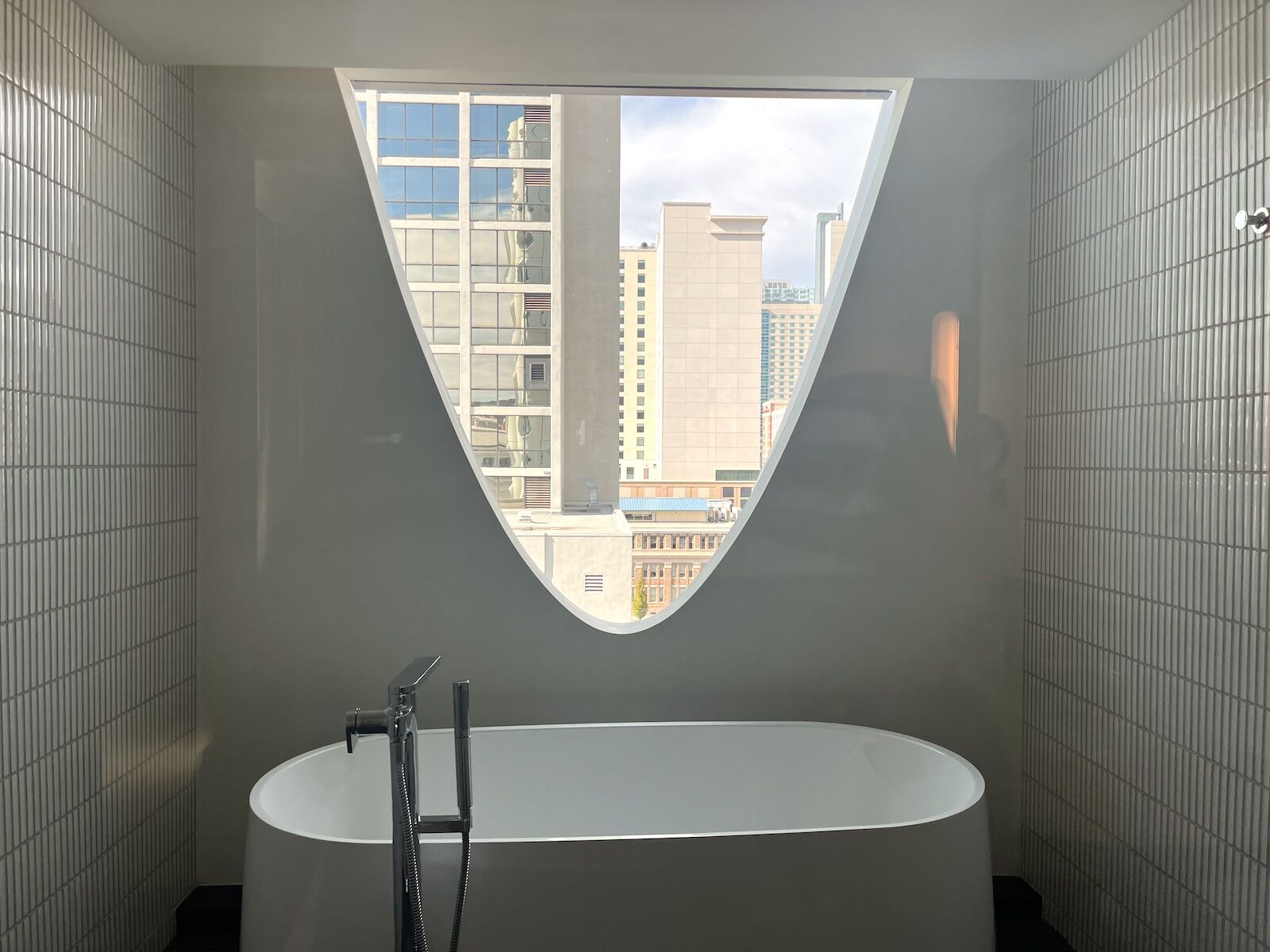
Three primary room types are available, including. a 125-square-foot “Hammock Queen” featuring windowsill hammock suites or “Grove Queen” featuring a work desk in place of the hammock. Then there’s the slightly larger Deluxue king and finally the grand Corner suites, which feature 270-degree views and an expanisve bathroom with rain showerheads, a bathtub next to a window overlooking the skyline, and multiple sating areas. My room was quiet and serene. All rooms at Populus have either a windowsill seat in one of the iconic “aspen-eye” windows or a workdesk looking out through one. Mine had the desk, which I appreciated as I tend to do a lot of writing in hotel rooms. The mini-bar was stocked with locally made snacks, beers, wines, and spirits, of which I had a refreshingly aromatic gin and tonic using the Native Colorado Gin from Dry Land Distillers.
Rooms are tech-forward with motion-sensor lights in the bathroom and cordless phone chargers in the bedside nightstands.
The Serta Presidential Suite Euro Pillow Top bed was soft and nearly indulgent, lined with equally-fluffy pillows that put me right to sleep after a long travel day capped with dinner upstairs. Decor is minimalist but shuns no comfort, evidenced by the stacked mini-bar, coffee table books, and multiple seating areas. If a kitchenette and more closet space were added — there was just a small closet with five or so hangers — I could live in this room for an extended time.
A rain shower head and traditional spray shower, along with a handheld shower spout were available in the bathroom. The star, however, was the soaking tub with a window overlooking downtown skyscrapers including the “mailbox building” and Republic Plaza — never have I bathed with such an iconic city view. The bathroom featured reusable toiletry dispensers and locally-made soap. The vanity featured a double sink and enough space that both my and my wife’s toiletry bags sat comfortably.
The gym, located on the second floor, is built for cardio and endurance training with Peloton bikes, treadmills, ellipticals, a stairclimber, and plenty of yoga and stretching mats. Freeweights are aplenty, abut there’s only one multi-purpose lifting machine.
Dining at Populus


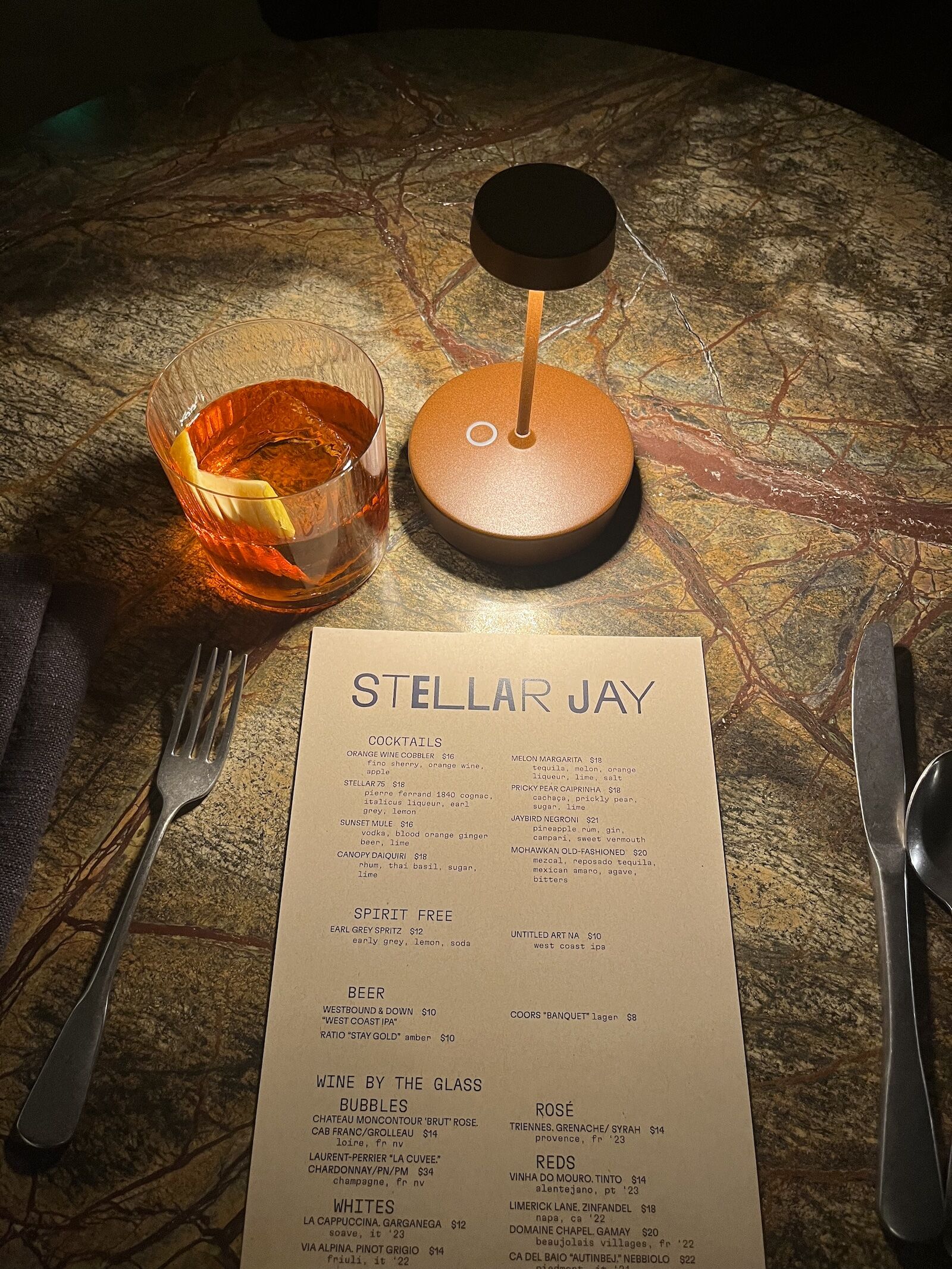

This forward-thinking approach carries through the entire stay. Dining at Stellar Jay, the dimly-lit, shared-plate-centric rooftop bar and restaurant on the hotel’s top floor, we strolled out to the balcony overlooking the Colorado State Capitol but dined inside near the open kitchen. Deep wooden hues define the interior of Stellar Jay, much like its dark-blue namesake bird and headlined by the wood-fired oven flaming bright in the kitchen. Named for the common-in-Colorado Stellar’s Jay bird, I remarked to a dining partner that perhaps the greatest amenity Populus provides is freedom from making a bad decision. For travelers and diners like myself who try to be conscious of their consumer decisions, it is decidedly refreshing to enter a restaurant or a hotel knowing that the tough choices have already been made. The plates are built to share and are delivered to the table “as ready.” Our party of three ordered several plates at once, and split them as they arrived. Our server asked about allergies or restrictions. The small menu contained both veggie dishes and heartier options, and because ingredients are responsibly sourced I felt comfortable embracing my veggie-and-fish preferences knowing that I’d be full when the dinner concluded.
Little Owl Coffee, located in the lobby, served an excellent Americano and fresh croissant for breakfast. On my second night I dined with my wife and daughter at Pasque on the hotel’s lobby floor. The ambiance here was clean and refined, like Stellar Jay the cocktail menu stands out, with an equally hearty menu of pasta, meats, and veggie-forward dishes. Although brighter and more in tune with the street level scene — both restaurants are open to the public — Pasque showcases local veggies in a more intimate setting. The service at each was excellent.
A forward-thinking boutique hotel right when the world needs it
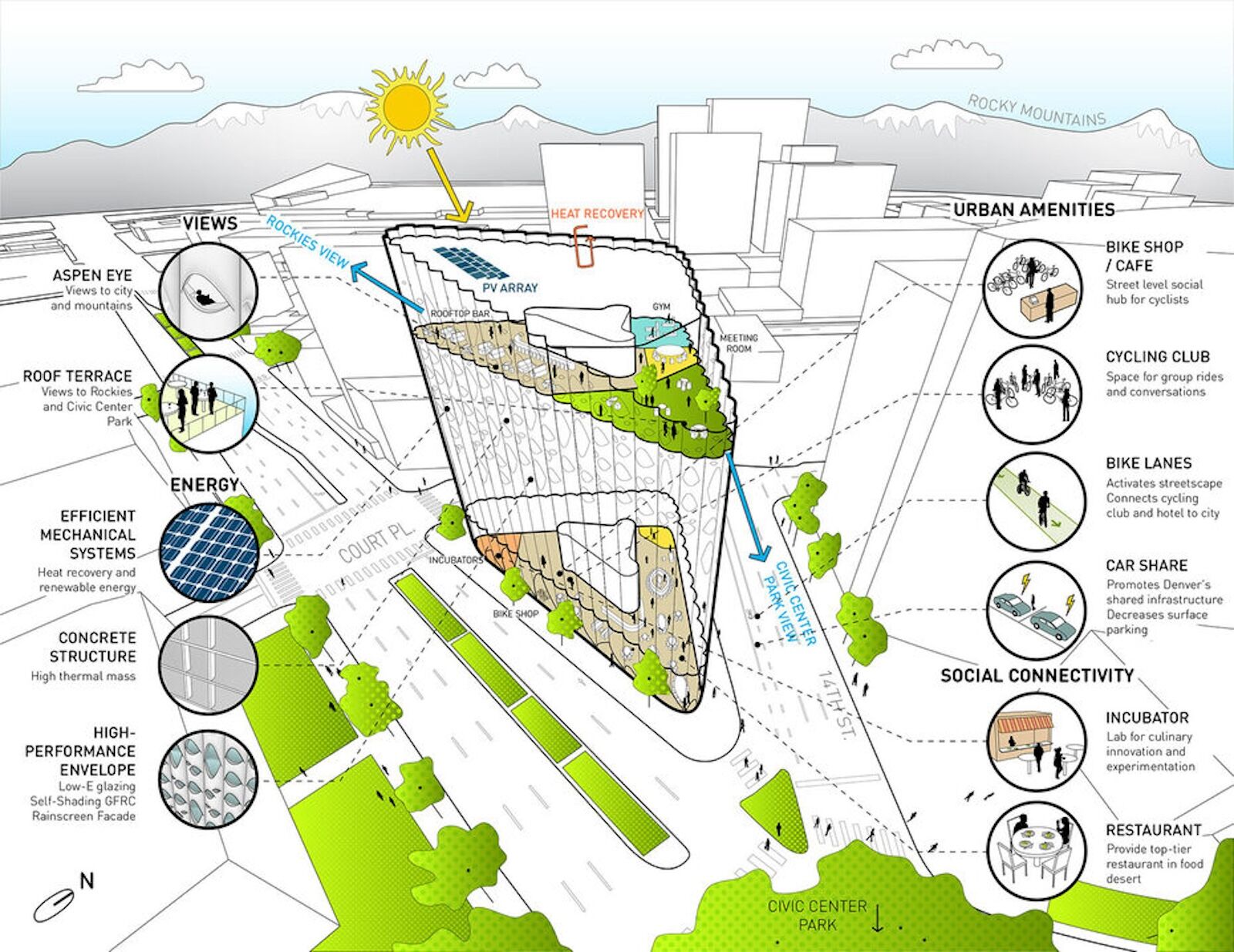
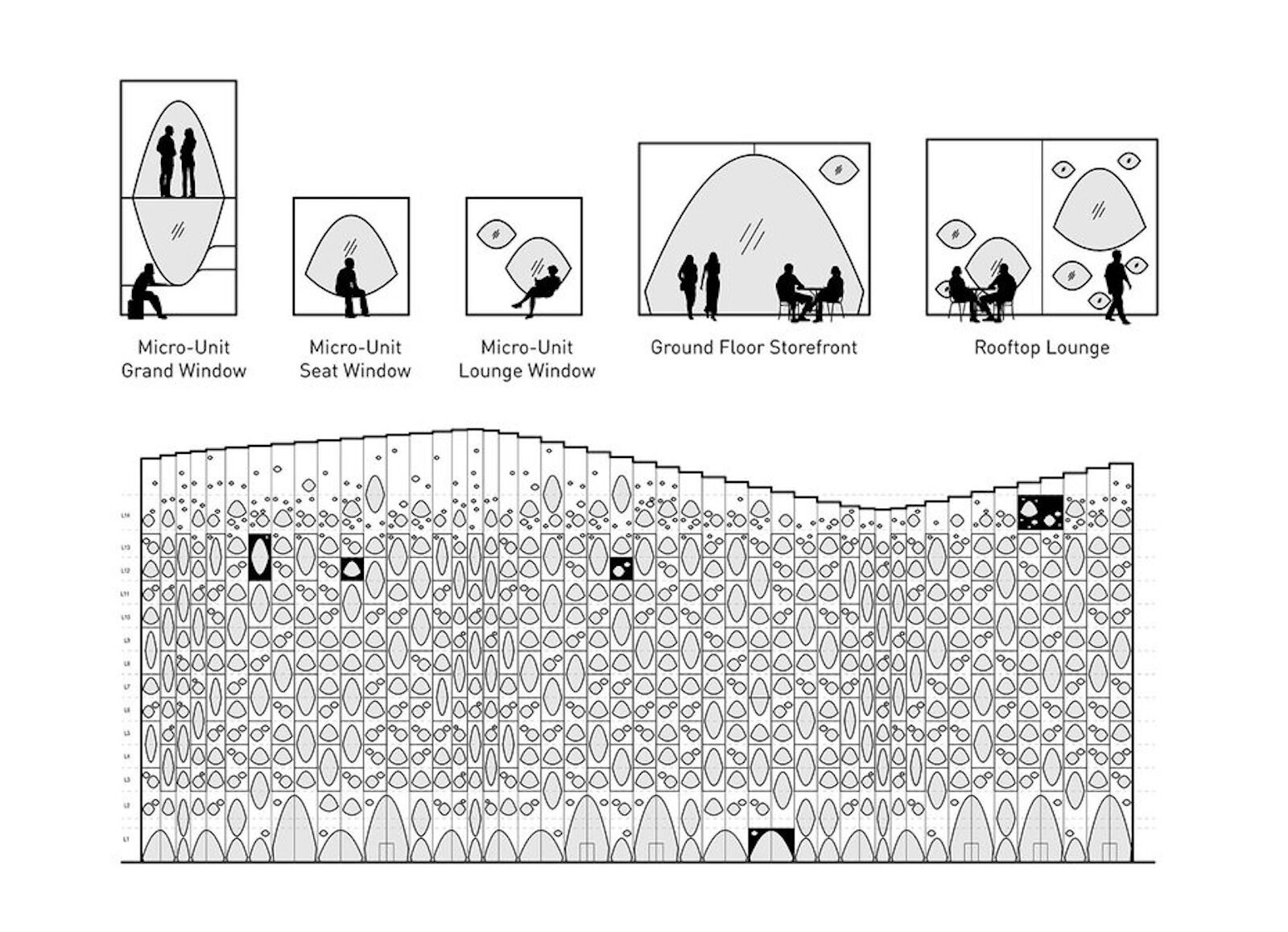
Tucked into the bedside nightstand in my room at Populus was a copy of Douglas Chadwick’s “Four Fifths a Grizzly: New Perspective on Nature that Just Might Save Us All,” a rigorous, science-backed takedown of humanity’s perceived separation from the natural world. Chadwick argues that the modern urban environment stimulates our evolutionary “fight or flight” response to stress, spiking cortisol and adrenaline levels, and that the cure is to embrace, rather than fence out, nature. Reading these words in the second-floor lounge and coworking area at Populus, bustling on this Sunday morning, I paused to look out at the rush and howl of the vehicles just outside on Colfax Avenue.
I thought about the expanse of concrete jungle that surrounded me, and how, while on a walk through City Center Park across the street, I’d felt a deep calm and satisfaction set in. The design team at Populus went to great lengths to mitigate urban overwhelm by creating a relaxing, natural-feeling space emblazoned by the woods of the Rockies. Essential oils waft the air, calling to mind that same relaxation taken from the outdoors. During the day, the hotel’s hallways remain dim – to the point that I couldn’t take a photo without the bright green “Exit” signs penetrating the shot.
“We want to offer that oasis away from the city from the moment a guest leaves the lobby,” Johnson told me.
Though in the heart of the city, Populus embraces the natural world and, with the conveniences of a luxury hotel, the result is an incredibly comfortable place to base yourself. It’s also a key insight into the future of sustainable urban design.
To Chadwick’s point, I believe that humanity is catching on to our mistakes, our fear of the outside world, and our innate desire to conquer or control it. The ethos and practices of Populus, its planners at Urban Villages, and operators at Aparium are the type of forward thinking that society needs now. My three-year-old daughter’s generation must grow up surrounded by and pushing forward the progressive practices represented here. If Populus catches on and this type of hospitality spreads , we’ll be one step closer to healing ourselves and our planet.